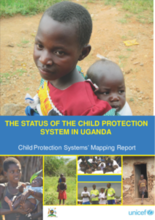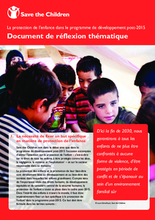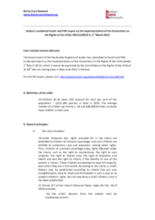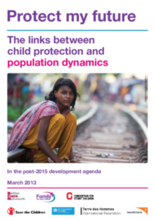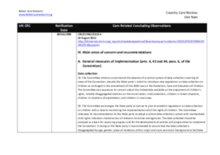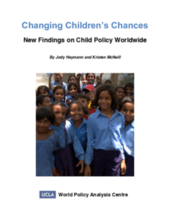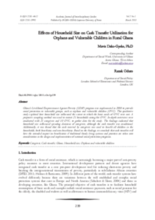Displaying 12781 - 12790 of 14580
This mapping process was commissioned by the Ministry of Gender, Labour and Social Development in order to facilitate the transitioning of Uganda’s approach to child protection from a disjointed, issue-based and project-oriented approach to a more system-oriented approach in order to respond effectively to the multi-dimensional and complex child protection needs of all children in the country.
This is an impact evaluation of New Generation, a three-year project comprised of two components: 1) A VSLA intervention involving the establishment of Village Savings and Loan Associations (VSLAs) and the provision of entrepreneurs
Le programme de développement post-2015 devrait notamment garantir que tout appel à un renforcement des financements des programmes de protection sociale servent à consolider les services de base fournis aux familles - et non aux institutions ou orphelinats - pour mieux soutenir celles-ci dans la prise en charge et la protection de leurs enfants.
Ce travail s’intéresse particulièrement aux violences dont les enfants placés en institutions sont l’objet, entre les maltraitances structurelles propres à l’institutionnalisation, et les maltraitances qu’elles soient physiques, psychiques ou sexuelles. Pour lutter contre ces différentes formes de violence, il conviendra de repenser les institutions actuelles et de chercher des alternatives au placement.
The Government of the Hashemite Kingdom of Jordan has submitted its fourth and fifth combined report on the implementation of the Convention on the Rights of the Child (dated 1st March 2013).
This paper is part of an inter-agency series on the links between child protection and major development goals. The report focuses on the links between child protection and population dynamics as they relate to the post-2015 Millennium Development Goals agenda.
This country care review includes the Concluding Observations for the Committee on the Rights of the Child adopted as part of its examination of Vietnam’s combined third and fourth periodic reports at the 60th Session of the Committee held between 9 May and 15 June 2012. The Committee’s recommendations on the issue of Family Environment and Alternative Care as well as other care relevant issues are highlighted.
This new report by the World Policy Analysis brings together key findings from the book, Children’s Chances: How Countries Can Move From Surviving and Thriving, providing a global picture of what laws, policies, and programs countries have in place to address areas vital to children’s healthy development.
This qualitative study explored how household size influenced the extent to which the basic needs of orphans and vulnerable children were met through the Livelihood Empowerment Against Poverty (LEAP) program in Ghana.
Zero to Three, a US based non profit organization working to inform, train and support professionals, policy makers and parents to improve the lives of infants and toddlers, combined the evidence from research on early childhood development with feedback from focus groups with families, friends, and neighbors who act as care givers to develop a range of practical resources to strengthen care practices with children between the ages of 0 and 3.

